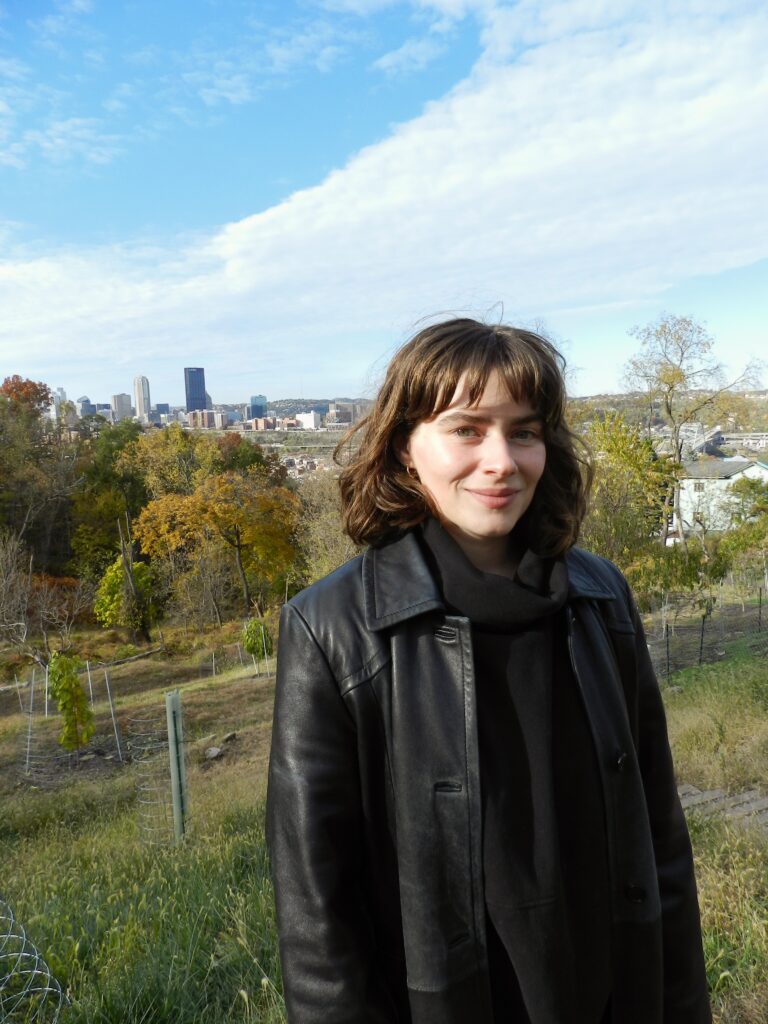
Bio
Eleni D. Contis, Assoc. AIA is an artist and designer based in Pittsburgh, PA. In her current role as Project Manager at Pfaffmann + Associates, she collaborates with local non-profit entities on resource-focused projects such as libraries, educational facilities, and affordable housing. She is passionate about creating meaningful spaces that foster connection, resilience, and a sense of belonging. Before joining P+A, Eleni served as design lead at Grounded Strategies, where she partnered with Pittsburgh residents to transform vacant parcels into accessible green spaces. She facilitated community workshops, led build-days, and supported neighborhood groups in shaping their visions for more vibrant public spaces. Eleni also developed and taught an elective urban design course at a local high school, reflecting her commitment to expanding access to design education and empowering future designers. Eleni earned her B.Arch and BFA degrees from the Rhode Island School of Design. Her academic work includes multidisciplinary collaborations with the Narragansett Tribe of Rhode Island, textile factory workers in Fall River, MA, and a bachelor’s thesis on cemeteries as cultural and ecological anchors in the urban landscape. A first-generation college graduate, Eleni believes that the spaces we live in are integral to the people we become, the stories we tell, and the futures we build. She views architecture as both a civic service and an artistic practice, and she aspires to inhabit the design process as a force of positive change. Eleni is thrilled to be a 2025 Paula Maynes Grant recipient, and she looks forward to advancing her path to licensure with the incredible support and encouragement of this award.
Interview
What sparked your interest in becoming an architect? Earliest Memory of Architecture? A: Honestly, I’ve never had one neat answer to this question. It feels like something that’s just always been a part of me. When I was four, my mom signed me up for my first art class at the Carnegie Museum of Art. The classroom was 20 times the height of the average toddler. It was painted a warm yellow, with thin windows at the very top. It felt like sitting in a box of sunlight. I wasn’t drawn to architecture because I wanted to design big buildings, or because I was a star math student. What really pulled me in was realizing how much the spaces around us affect how we feel about ourselves and each other. My family worked incredibly hard to build a good life, but I remember feeling like our home never quite matched how much love and effort went into it. I think a lot of first-generation families feel this tension, wanting your surroundings to reflect your values and your pride, even when it’s hard to make that happen. I want to make people feel safe, inspired, and at home in the world.
How has your experience training to be an architect served you in your volunteer and community service? Why is it important for emerging professionals to get involved in their communities? I think that sometimes “community service” and “giving back” are framed in a way that makes them feel like a chore at best and a gimmick at worst, and that’s really unfortunate. The practice of architecture has as much to do with the relationships you build as it does with the design and construction of a building; you have to understand what your clients truly need, and it’s hard to do that from behind a desk. The people who need your services most probably aren’t going to send you an email. You have to get to know your neighbors, strike up conversations with local business owners, and show up to neighborhood meetings. You need to figure out who is already doing this work in your city, and find ways to develop strategic partnerships. This is how you catalyze a truly impactful project. You have to start in your own backyard.
What role has mentorship played in your professional development? Any advice for those looking to get the most out of their mentorship opportunities? Finding good mentorship can be one of the hardest parts of professional growth. Not everyone wants to help, and that can be really discouraging. I definitely learned that early on. I had a few experiences where people told me not to even bother trying to get my license, and that really stuck with me. Because of that, I take mentorship very seriously. If someone wants to become an architect and they ask me for support, I do my absolute best to share my knowledge and my resources. The hard parts also made me appreciate the people who did show up for me, the ones who share my values and reminded me why I wanted to be here in the first place. Sometimes it takes a few cold phone calls and awkward conversations to find your people, but you will. And you realize mentorship doesn’t always come from one perfect person, you can learn something valuable from almost everyone you meet.
In your spare time, do you pursue any interesting hobbies or extracurricular pursuits? Actually, this past summer I got to do something really cool. I got some friends together and we made a mural for East Carson Street in the South Side, for a building that’s been boarded up due to fire damage. This was my first public art project, and I’m so excited to do more. (Sidenote: if I had stayed home instead of going to that community meeting, I would have never met the amazing folks behind Art on Carson and this opportunity would have never crossed my path).
